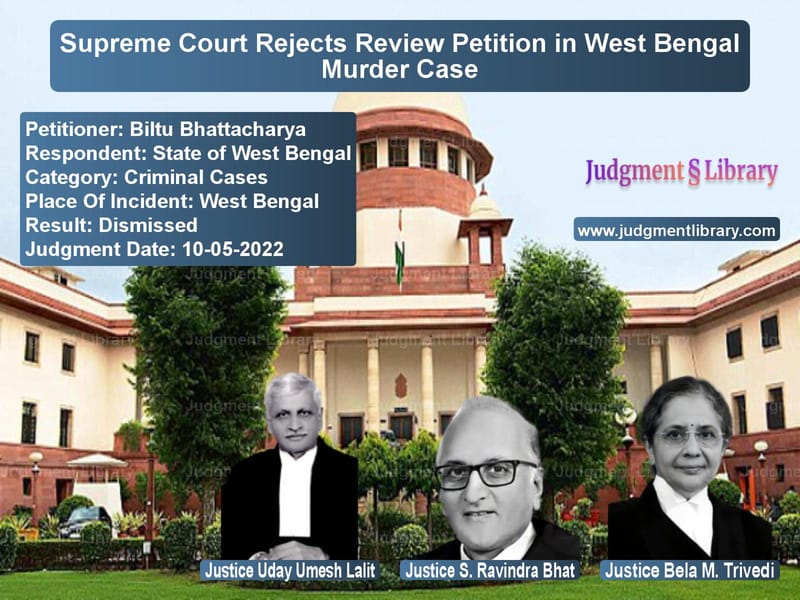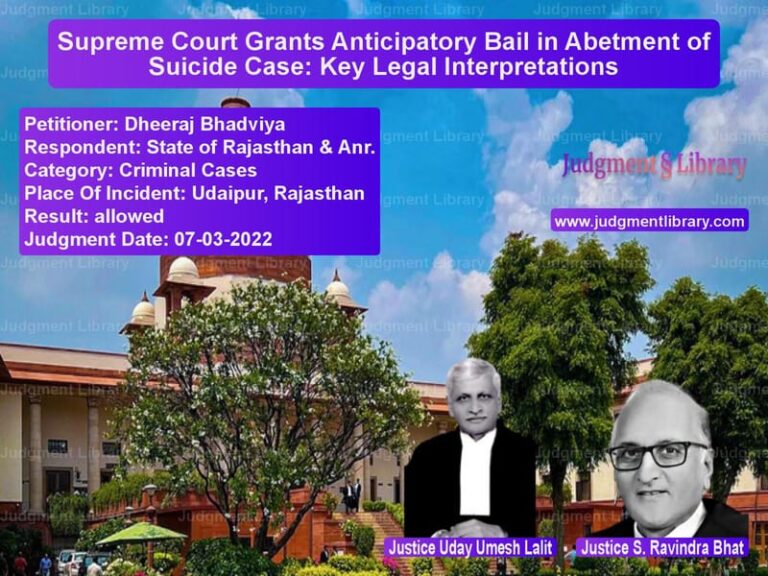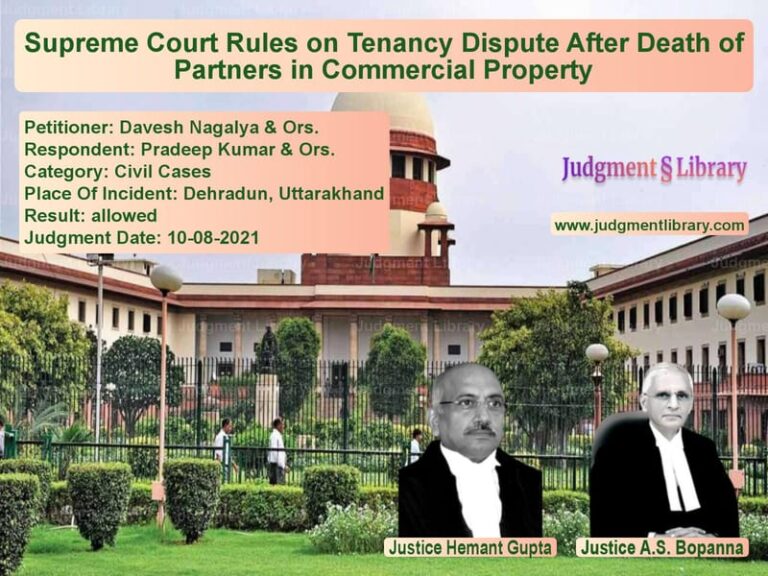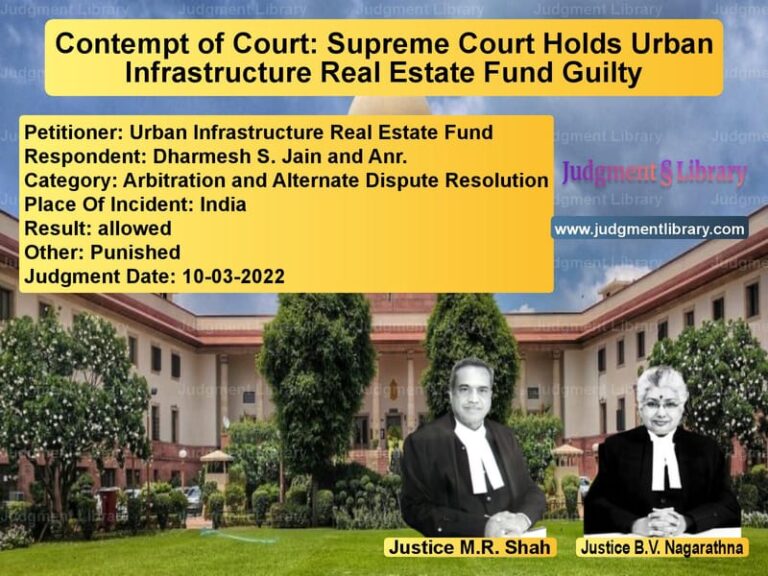Supreme Court Rejects Review Petition in West Bengal Murder Case
The Supreme Court of India recently dismissed a review petition in the case of Biltu Bhattacharya vs. State of West Bengal, affirming the conviction and sentence of the petitioner for murder and conspiracy. The Court ruled that there was no error apparent on the record that warranted interference with the previous judgment.
The petitioner had been convicted under Sections 302 and 120-B of the Indian Penal Code (IPC) and Section 27(3) of the Arms Act, 1959. The trial court and the High Court both upheld his conviction and sentence, leading him to file a review petition before the Supreme Court.
Background of the Case
The case revolved around a premeditated murder in West Bengal, allegedly carried out as part of a conspiracy. The prosecution presented forensic evidence, witness testimonies, and electronic evidence to establish the involvement of the petitioner.
The trial court found him guilty and sentenced him to rigorous imprisonment. The High Court upheld the trial court’s decision, leading the petitioner to challenge the verdict in the Supreme Court through a criminal appeal. However, the Supreme Court also upheld his conviction in Criminal Appeal No. 1182 of 2019.
Following the rejection of his appeal, the petitioner filed a review petition, arguing that there were legal errors in the judgment.
Key Legal Issues
- Whether the Supreme Court should review and overturn the conviction based on errors apparent on record.
- Whether the evidence presented was sufficient to justify conviction under Sections 302 and 120-B IPC.
- Whether there was a violation of fundamental rights in the trial process.
Arguments Presented
Petitioner’s (Biltu Bhattacharya) Arguments
- The conviction was based on circumstantial evidence rather than direct proof of guilt.
- The lower courts misinterpreted key evidence and failed to consider contradictions in witness statements.
- The case should be reviewed because of procedural irregularities that violated the petitioner’s right to a fair trial.
Respondent’s (State of West Bengal) Arguments
- The petitioner was given multiple opportunities to present his defense at every stage of the trial.
- The evidence was sufficient to establish a clear chain of events linking him to the crime.
- The conviction was upheld by both the High Court and Supreme Court, leaving no room for a review.
Supreme Court’s Observations and Ruling
1. No Error Apparent on Record
The Supreme Court examined the review petition and found no new arguments or errors in the previous judgment that would justify interference. The judgment stated:
“We have gone through the grounds raised in the Review Petition and do not find any error apparent on record to justify interference.”
2. Review Petition Dismissed
The Court rejected the petitioner’s request for reconsideration and confirmed the previous verdict:
“This Review Petition is, therefore, dismissed.”
3. Finality of Supreme Court Judgments
The ruling reaffirmed that review petitions are not an opportunity to reargue cases but are limited to correcting errors evident on the face of the record.
Impact of the Judgment
1. Strengthening Finality in Criminal Cases
The decision underscores the principle that once the Supreme Court delivers a verdict, it should not be reopened without a clear and compelling reason.
2. Reaffirming the Standard for Review Petitions
The ruling clarifies that review petitions are not another round of appeals but must be based on a demonstrable error in judgment.
3. Deterrence Against Frivolous Review Petitions
The judgment discourages filing review petitions that merely seek to delay the execution of sentences without a valid legal basis.
4. Validating the Judicial Process
The Court’s decision affirms that the trial and appellate process adhered to constitutional safeguards, ensuring fairness in the conviction.
Conclusion
The Supreme Court’s ruling in Biltu Bhattacharya vs. State of West Bengal upholds the principle of judicial finality and reinforces the strict criteria for reviewing criminal convictions. By dismissing the review petition, the Court has ensured that justice is not delayed through repeated legal challenges without valid grounds. This case serves as a key precedent in maintaining the integrity of the criminal justice system and preventing unnecessary litigation.
Petitioner Name: Biltu Bhattacharya.Respondent Name: State of West Bengal.Judgment By: Justice Uday Umesh Lalit, Justice S. Ravindra Bhat, Justice Bela M. Trivedi.Place Of Incident: West Bengal.Judgment Date: 10-05-2022.
Don’t miss out on the full details! Download the complete judgment in PDF format below and gain valuable insights instantly!
Download Judgment: biltu-bhattacharya-vs-state-of-west-bengal-supreme-court-of-india-judgment-dated-10-05-2022.pdf
Directly Download Judgment: Directly download this Judgment
See all petitions in Murder Cases
See all petitions in Bail and Anticipatory Bail
See all petitions in Judgment by Uday Umesh Lalit
See all petitions in Judgment by S Ravindra Bhat
See all petitions in Judgment by Bela M. Trivedi
See all petitions in dismissed
See all petitions in supreme court of India judgments May 2022
See all petitions in 2022 judgments
See all posts in Criminal Cases Category
See all allowed petitions in Criminal Cases Category
See all Dismissed petitions in Criminal Cases Category
See all partially allowed petitions in Criminal Cases Category






